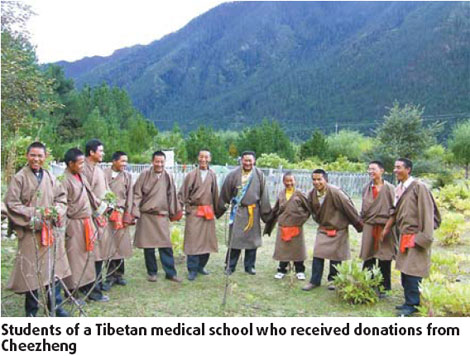


In the past, Tibetan medicine was mainly used in Buddhist temples, and most of the doctors were monks.
Therefore, for a long time, outsiders knew little of the effects of Tibetan medicine.
So when Lei Jufang decided to develop her Tibetan medicine business Cheezheng, one of her first tasks was to spread the word about Tibetan medicine to as many people as possible.
Lei believes the key to Tibetan medical industry is in Tibet's culture. "The Tibetan medical culture is a profound system. We needed to fill a huge gap first in order to convey the culture into an industry," she says. "One of the most urgent tasks for Tibetan medicine makers is to build a bridge to connect the industry with the Tibetan culture."
So, in Cheezheng's early days Lei began by also publicizing Tibetan medical culture. And the marketing strategy played a key role in the brand building.
From 1994 to 1995, the company ran a series of columns on Tibetan medicine and told stories about famous Tibetan doctors.
In 1996, it organized performance groups to travel around China and promoted its products to audiences who came to watch the show. It also organized a chorus team and held New Year concerts, to showcase Tibetan folk and religious music. The events were entertaining and helped establish Cheezheng, as a newborn medicine brand rooted in obscure regions of Gansu and Tibet.
In addition, as a professional scientist, Lei also emphasizes the brand's influence in the academic and scientific worlds. She organizes medical seminars frequently and also sponsors the publication of books and documents on Tibetan medicine.
Cheezheng also pays attention to its publicity overseas. Its pain relief plaster gained the approval of the United States Food and Drug Administration several years ago, one of the earliest such products to do so. And at a Tibetan culture week held in Russia last year, it was the only Tibetan medicine from China.
Lei is also a frequent guest at international medical seminars. Compared with other local Tibetan medical companies, Lei's international vision helps.
"My early training helped me to keep pace with the latest developments in the industry, and that also puts me in an advantageous position," she says.
Another important part of Tibetan medical culture, says Lei, is that medicine is never really separate from doctors using it. Thus training Tibetan doctors has also become an important part of her company. Lei has set up several schools in Tibet, selecting students from the poorest families, paying for their school fees and training them as doctors.
All the work has turned Lei into a preacher for Tibetan medical culture. "I think I am trying to protect the (Tibetan) spiritual values by doing these enterprises," she says.
(China Daily 06/30/2008 page12)













